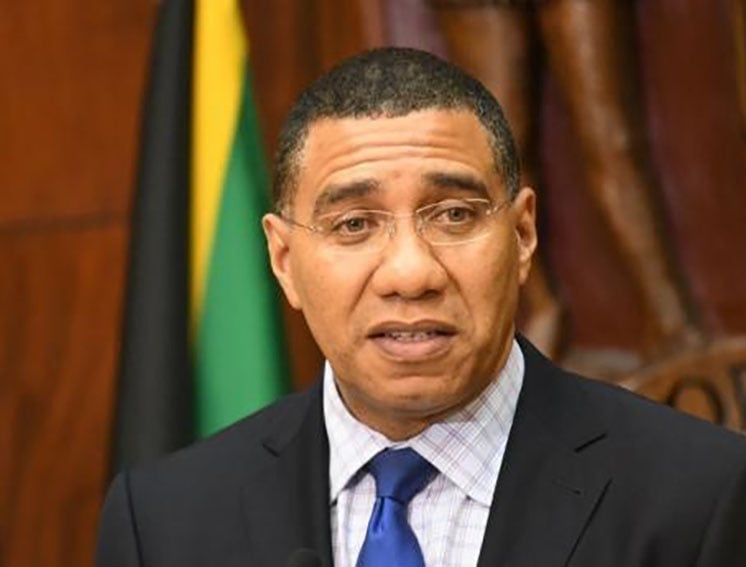(Jamaica Gleaner) Prime Minister Andrew Holness has applied to the Supreme Court to have an Integrity Commission investigation report into his financial affairs rejected as “unlawful”, “unfair” and premised on an “unconstitutional” law.
“I believe that the tabling of the report was intended to embarrass and cause harm to me and as such was made for an improper purpose and in bad faith to prejudice and harm me,” he said, adding that it sought to impute “criminal and unethical conduct to me and the other applicants”.
Holness’ application for permission to seek judicial review of actions of the anti-corruption agency was filed on September 30. The report was released by the House of Representatives on September 17. He is seeking 21 orders or declarations on 69 grounds.
A judicial review allows the court to scrutinise processes used by a public authority to make decisions.
The applicants are Holness, his company Imperium Investments Holding Limited, and two other connected entities – Positive Media Solutions Limited and Positive Jamaica Foundation Limited, a charity.
The respondents are two senior executives of the commission, Director of Information and Complaints Craig Beresford (first respondent) and Director of Investigations Kevon Stephenson (second respondent), and the commission itself (third respondent).
The probe started with the 2021 income filings but Stephenson said he flagged an “unexplained growth” of $1.9 million in Holness’ declared assets for 2022. Additionally, deposit and withdrawal transactions of $473 million and $427 million involving the named companies raised questions. Issues around tax compliance and charity funds were also noted.
Stephenson could not conclude the investigation, citing Holness’ “refusal” to provide a breakdown of his expenses for 2019-2022. The commission said it could not certify the 2021 filing and referred the matter to the Financial Investigations Division (FID), Jamaica’s main agency for financial crimes.
But Holness contended in the court documents that those conclusions are flawed.
He also argued that the probe into his filings for 2019-2022 was premised on what he believes is an “unconstitutional” provision of the Corruption Prevention Act (CPA) – Section 14 (5), which outlines that a person who fails to satisfactorily explain their wealth relative to their earnings commits the offence of illicit enrichment. He asserted that the provision undermines persons’ constitutional entitlement to the presumption of innocence and should be struck down.
Regarding the illicit enrichment provision of the CPA, Holness said his lawyers have advised him that “the section… places a burden on me to prove an essential element of the offence of ‘illicit enrichment’, that is the wealth element”.
But he said “the problem is compounded by the fact that the respondents already had the sum that I was required to explain, but failed to disclose it to me so that I could adequately respond or cause representations to be made on my behalf to resolve the matter”.
Meanwhile, Holness said the IC’s director of investigations “collected evidence, analysed it, made findings of fact all while combining the roles of investigator, prosecutor and judge”.
Holness also has a problem with the extent of information disclosed in the 171-page investigation report, claiming that “the contents of the report disclosed the personal and private information of the applicants in breach of privacy and the data protection laws of Jamaica”.
“It was more than is necessary to make the report to Parliament. I was asked questions in a vacuum, and I was only provided with the documents in appendix,” he said in a 37-page affidavit to support his court application.
The prime minister rejected the IC’s assertion that he refused to provide details of his expenses, contending that there was no request for “any income and expense statements” for 2019 and 2020.
“The objections that I put forward were dismissed without a hearing. This was improper given the substantial nature of the objections that in some cases went to the respondents’ jurisdiction. In addition, I have a right to privacy,” Holness said, charging that his objections were ignored.
He alleged that it was “unlawful” and “unfair” for Stephenson and the commission to extend the investigation from the 2021 declarations to include the filings for 2019, 2020, 2022 and 2023.
Among the orders being sought are for the commission to be compelled to examine the outstanding filings and that Holness be exonerated in relation to the findings for 2021 and 2022.
The prime minister is also urging the court to declare that referral of the report and findings to the Financial Investigations Division and Tax Administration Jamaica “represents an unlawful delegation and/or abdication of the 2nd and 3rd Respondents’ and/or the Director of Corruption Prosecution’s statutory responsibility”.
The only report Holness said should be retained is one regarding the ruling of the Director of Corruption Prosecutions who ruled out criminal charges for the failure to declare four bank accounts, an issue that arose from a separate probe.
Holness also wants the court to order the IC to pay him damages for breach of privacy, including for stigma, negligent investigation. He also wants vindicatory and aggravated damages.
He also wants the court to strike down provisions of the 2017 Integrity Commission Act “given the lack of fairness, impartiality and independence in the exercise of the functions of the divisions and the commission as presently structured”.
Holness is being represented by the law firm Henlin Gibson Henlin.





